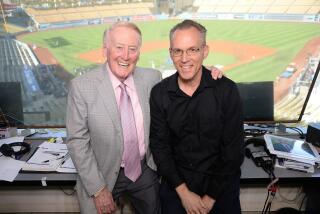Howe Takes Bitter Look Back at Drugs--and at Baseball : ‘I screwed up,’ the former Dodger pitcher said. The audience seemed more than forgiving.
- Share via
Steve Howe, who pitched under the bright lights of Dodger Stadium before a cocaine habit steered his career off course, has joined the ranks of athletes speaking out against drug abuse.
“I screwed up,” Howe said Tuesday, lecturing a group of students at California State University, Northridge.
Appearing at the school without a fee at the request of two student organizations, Howe alternated between talking about the perils of drug abuse and repeating past complaints about how baseball officials and the press treated him.
“I’m going to make sure that what happened to me doesn’t happen to other athletes,” he said, referring not only to drug abuse. “We are being stereotyped. We are being singled out. That isn’t right.”
Sympathetic Audience
He spent an hour and a half with a sympathetic audience of more than 100, some of whom wanted to know if they might see him in Dodger blue ever again.
“You never know,” Howe said, revealing a sheepish grin that seemed to say that would suit him just fine.
Howe, 28, was released by the Dodgers in July, 1985 after a six-year career in which he was treated for cocaine addiction three times and suspended once. He joined the Minnesota Twins but was released in September of that same year after a cocaine-related absence.
He returned to baseball this year with the San Jose Bees of the California League, but his troubles continued. After being suspended and later reinstated, Howe in July tested positive for cocaine and was suspended again.
He talked then of retirement, but said Tuesday that he is considering an offer to play baseball in Japan.
Although Howe praised the Dodger organization, he described his tribulations with baseball in a bitter tone.
Blames Ueberroth
He blamed Baseball Commissioner Peter Ueberroth for releasing the results of drug tests at San Jose, tests Howe still insisted were in error. Howe said that, although he once had a $1,000-a-week cocaine habit, he has not used the drug in more than a year.
But he said he is on “a de facto blacklist,” making a veiled reference to Ueberroth.
He blamed the “totally opinionated” Los Angeles media. “I was afraid to sneeze for fear that they would pick it up and analyze it,” he said. “It would have helped me tremendously if they just would have burned those papers.”
But he also blamed himself.
“I screwed up,” Howe said. “Nobody forced me to use cocaine.”
The audience seemed more than forgiving.
“I’d like to see him play for the Dodgers again,” junior Cindi Harris said.
“Chemical addiction is a disease and it’s a problem throughout society, not just athletes,” senior Julie Hazan said, echoing Howe’s message.
Howe, who said he began speaking to colleges and high schools about drugs two years ago, came to campus at the request of a friend, Lisa Niedenfuer, the ex-wife of Dodger pitcher Tom Niedenfuer and president of a school honor group.
Loud Applause
The Golden Key Honor Society co-sponsored Howe’s appearance with the student government, which paid his expenses. A school official said Howe came from Arizona for the talk.
When Howe’s talk was done there was loud applause, and about 20 people surrounded him, asking for autographs as if it were an hour before game time on a Saturday afternoon.
Not all the questions were about drugs.
One fan, Lou Marino, had Howe sign a baseball. Howe, who has a World Series ring on his right hand, jammed the ball between the index and middle fingers of his left hand. It was the grip of one of baseball’s currently celebrated pitches, the “split-finger fastball.” The pitch drops just as it reaches home plate.
“Is it the rotation that makes it drop, or just the velocity?” Marino asked.
A little of both, Howe explained.
More to Read
Go beyond the scoreboard
Get the latest on L.A.'s teams in the daily Sports Report newsletter.
You may occasionally receive promotional content from the Los Angeles Times.










